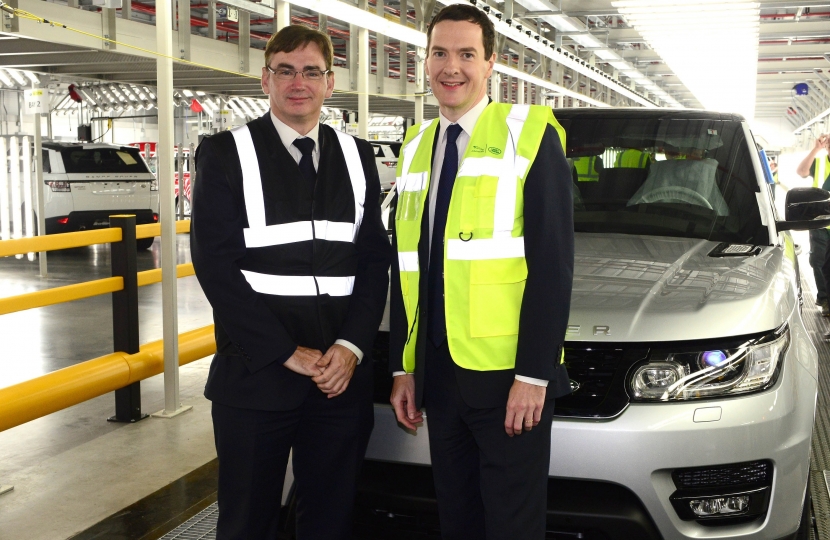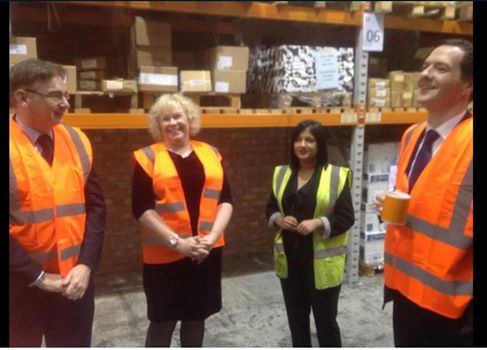
The independent Office for Budget Responsibility predicts that our economy will grow by 2.4% in 2015. This is slightly lower than they forecast in March, but still faster than the growth predicted for America or Germany.
- For the second year in a row, Britain is expected to have the strongest economic growth of any major advanced economy.
- Thanks to this growth, employment is predicted to continue rising.
- The deficit is predicted to fall to less than half of what it was in 2010 when the Conservative government came into power.
Our economy is growing, more people are in work, and the deficit is falling. HOWEVER the Government is still borrowing too much because we are still spending too much. Some on the left want an end to austerity. But we only have to look at Greece to see what the alternative back in 2010 could have been. We need to be back into the black.
Getting Britain back in the black

To start earning more than we are spending, the Government will either have to cut spending or increase tax. The amount of money we have to find is £37 billion.
Labour’s key mistake was to spend more than they earned in the ‘boom’ times before the banking crisis, which mean that when the crunch happened we ended up adding a lot of money to the national debt. If Labour had been earning more than they spent, we would not have to be making painful decisions now.
Thanks to the recovering economy, there are two bits of good news. The first one is that income from tax was higher than predicted. The second is that the government is actually raising money by selling off the banks we bailed out.
This means that to get the country back into the black by 2020, we will not have to cut any faster than we did in 2010-2015.
So, where do we find this £37 billion? As we promised:
- We will NOT do this by increasing income tax, national insurance, or VAT. Here in Solihull, we will NOT have to pay more in tax.
- We will SAVE £12 billion from the welfare budget.
- This means we will have to make SMALLER cuts to public services.
- We will RAISE £5 billion from tackling tax evasion.
- The remaining £20 billion will come from departmental spending cuts to be identified this autumn.
Tackling aggressive tax avoidance and evasion
The Chancellor announced a number of measures to tackle aggressive tax avoidance and evasion, which taken together are predicted to raise an extra £5 billion a year.
As Conservatives, we believe in low taxes, but we are equally passionate about ensuring that people and businesses pay their fair share.
Moving to a high wage, low tax, low welfare economy
The UK has 1% of the world’s population, it generates 4% of the world’s income but it is responsible for a whopping 7% of the world’s welfare spending. As Conservatives, we want to move to a country where people are paid more, the Government takes less of their money and we therefore have to spend less on welfare.
LOW WELFARE: Much of the welfare budget goes to the elderly and the disabled. The Chancellor made it clear that he won’t be cutting that – as a town with nearly 20% of the population approaching retirement age, this is important for us here in Solihull.
In 1980, 8% of welfare went on people of working age. Today, it is 13%. It is this that the Chancellor wants to reduce.
Some of the key changes are:
- · people aged 18 to 21 will have to work or be in education, not on out-of-work benefits and, with the exception of vulnerable young people, they will lose their entitlement to housing benefit. 18 year olds who get a job can rarely afford their own place - why should those who aren’t working be able to?
- · working age benefits, including tax credits, will be frozen for four years;
- · the level of earnings at which a family’s tax credits and universal credit start to be withdrawn will be reduced and the rate at which tax credits are withdrawn will be increased so that help is focused on those most in need;
- · families who have a third or subsequent child after April 2017 will not receive additional tax credit or universal credit. Support for families who make a new claim to universal credit after this date will also be limited to two children and we will make similar changes to housing benefit;
- · support for mortgage interest payments will be turned from a benefit into a loan;
- · rents in social housing will be reduced by 1% a year for four years. This will help to control the housing benefit bill, but it’s also good news for most council and housing association tenants;
- · those families living in social housing with incomes of over £40,000 a year in London and over £30,000 a year elsewhere will have to pay a market rent rather than a subsidised one; and
- · the cap on the total amount of benefits an out of work family can receive - introduced by the Coalition Government after some families were receiving more than £50,000 a year under Labour - will be reduced from £26,000 to £23,000 in London and £20,000 elsewhere
LOW TAXES: The simplest way to help working people is to let them keep more of the money they work hard to earn. We are an aspirational town, and I want to see young, lower-wage earners being able to keep more of their money.
At the Election, we promised to increase the amount of money you can earn before you start paying income tax to £12,500 and the threshold at which people start paying the 40p rate to £50,000. Yesterday, the Chancellor made a start on delivering both of those promises, raising the personal allowance to £11,000 and the 40p threshold to £43,000. As a result, 29 million people will pay less in income tax.
HIGH PAY: At present, employers can get away with paying their staff less than they need to live on because they know the Government will top those salaries up. This isn’t right.
People who work hard in low paid jobs deserve a pay rise and that’s what they’re going to get. The Chancellor announced that he is introducing a new compulsory National Living Wage for everyone aged 25 and over. It will start next April at £7.20 an hour - a significant increase on the current minimum wage - and it will increase to £9 an hour by 2020.
If you run a small business, the Chancellor will ensure that you can afford to pay your lower-paid staff more. We are cutting corporation tax to 19% in 2017 and to 18% by 2020. We are also increasing the Employment Allowance - which reduces the National Insurance Contributions businesses have to pay - to £3,000 in 2016.
Extending the Rent-A-Room Scheme
I am particularly proud of the extension of the Rent-A-Room scheme, a proposal which I had submitted to the Chancellor for inclusion in the Budget. This means that if you rent out a room in your house, you can now earn more before you have to pay tax.
During my campaign, I spoke to many homeowners on the doorstep who rent out a room in their house to help pay the mortgage. The ability for young people to buy a home and then rent out spare rooms means that more young people can take on a mortgage. It can help single people to get a mortgage without needing a joint income, act as a safety net is a job is lost or a marriage breaks down. The amount you can earn before paying tax has now risen from £4,250 to £7,500.
Other Budget measures
- 3 million more apprenticeships. Solihull has an excellent record with apprenticeships, but I want to see it made even better. The Chancellor is introducing an apprentice levy on all large firms, to help fund 3 million more apprenticeships.
- A fairer deal for motorists. Solihull is a commuter town. I am proud to say that from 2020, the tax on people’s cars will go into a new fund to improve the roads they drive on. And fuel duty will remain frozen this year.
- Only millionaires to pay Inheritance Tax. Here in Solihull, I know that families have worked hard for years to pay off their mortgages for their family homes. We are now one of the most expensive places to live outside the South, but this should not affect people passing on their homes to their children. I am now proud to say that, as of 2020, people can pass on homes worth up £1 million without paying inheritance tax.
- More money for the NHS
- And more money for defence.
- 1% annual pay rises in the public sector.
With thanks,
